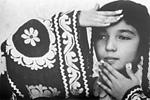SINCE THE REVOLUTION, Mohsen Makhmalbaf has gradually embraced an aesthetic that some might call secular, resulting in censorship by Iranian authorities. Accordingly, he made 1998’s The Silence in Persian-speaking Tajikstan, where beautiful women wear colorful outfits instead of black chadors. Its story couldn’t be simpler or—on the surface—more pathos-ridden. Korshid, a 10-year-old blind boy indelibly played by Tahmineh Normativa, supports his mother by tuning stringed instruments for a gruff music store owner. Korshid’s only friend is the kind girl Nadereh (Nadereh Abdelahyeva), who escorts the easily distracted lad through the bustling city. Korshid has a thing for beauty—faces, voices, sound, and above all, music. If Nadereh loses his hand, he’s apt to wander off, using his acute hearing to zero in on a singer, musician, or radio. (In one memorable scene, panicked Nadereh locates him by shutting her eyes and following the aural cues that would draw him.) On a bus, Korshid lectures a pair of schoolgirls, “Your eyes distract you. If you close your eyes, you’ll learn better.”
THE SILENCE
A MOMENT OF INNOCENCE
written and directed by Mohsen Makhmalbaf
runs March 31-April 6 at Varsity
Meanwhile, at home, impoverished Korshid and his mother are about to be evicted. The situation invites melodrama, but Makhmalbaf has no interest in easy answers or teary conclusions. Instead, Korshid adamantly tries to “seize the moment,” to enjoy what few instants of pleasure and beauty his harsh life allows. Strumming a lute-like instrument in one remarkable scene, he’s content yet oblivious as Nadereh dances ecstatically, her ears garlanded with cherries, her nails adorned with flower petals.
Equally worth seeing is Makhmalbaf’s 1996 film A Moment of Innocence, which recounts his 1974 stabbing of a policeman, told from both his and the cop’s perspective as he films their story. Reenactment and reality blur together as each directs the rehearsal of the young actors portraying them. The descent of idealism into violence is the real subject of this self-reflective movie that’s equally funny and profound.








